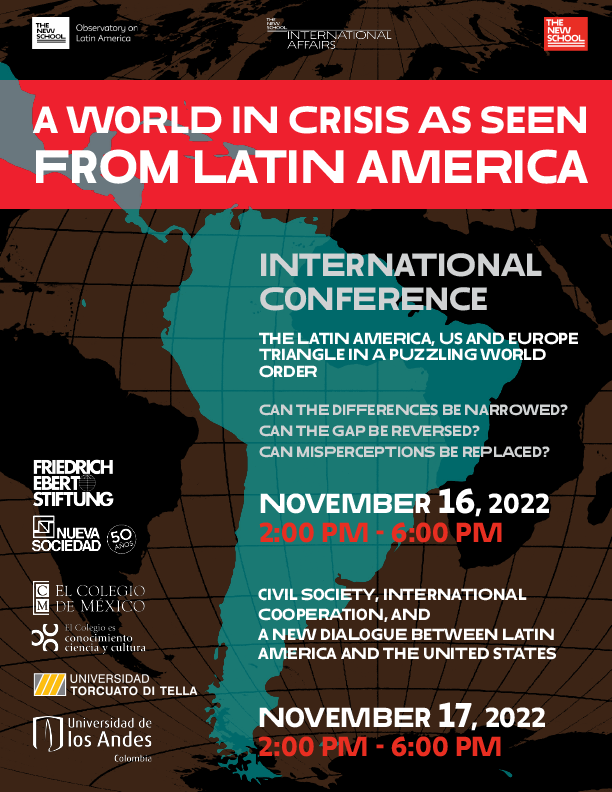 | |||||||||||||||||||||||||||||||||||||||||||||||||||||||||||||||||||||||||||||||||||||||||||||||||||
 | |||||||||||||||||||||||||||||||||||||||||||||||||||||||||||||||||||||||||||||||||||||||||||||||||||
Please join us for | |||||||||||||||||||||||||||||||||||||||||||||||||||||||||||||||||||||||||||||||||||||||||||||||||||
A World in Crisis as Seen From Latin America | |||||||||||||||||||||||||||||||||||||||||||||||||||||||||||||||||||||||||||||||||||||||||||||||||||
Part I The Latin America, US and Europe triangle in a puzzling world order: Can the differences be narrowed? Can the gap be reversed? Can misperceptions be replaced? Presented in partnership with Nueva Sociedad and the Friedrich Ebert Foundation. November 16, 2022 2:00-6:00 pm Consulate of Argentina 12 West 56th Street New York, New York This event has a double purpose. First, to present and discuss major findings of a survey entitled "European Union - Latin America: Perspectives, Agendas and Expectations". This survey was organized by Latinobarómetro in the second half of 2021 and polled a representative sample from ten Latin American countries: Argentina, Brazil, Bolivia, Chile, Colombia, Costa Rica, Guatemala, Mexico, Uruguay and Venezuela. The survey design sought to fill in the gaps in information about local attitudes towards global issues. Its driving motivation has been to evaluate the region's capacity to react, how people in Latin America think about the turbulent international situation, and their perceptions of the type of action, leadership, and examples being set by the central actors of the global system. Our second aim is to link this evaluation with a reflection on the dilemmas shared by Latin America, Europe, and the United States in face of the ongoing uncertainties and threats that currently dominate global affairs. While this survey has been conceived and designed in the midst of major global transformations, its final results are being publicly released in a context of particular dramatic geopolitical events with myriad impacts on the societies and governments of the North and the South. While such impacts are far from homogeneous, they do raise common challenges that could lead to innovative approaches and eventually to collaborative initiatives in world politics and economics. Panel 1 2–2:10 pm Welcome Mary Watson, Executive Dean, New School for Public Engagement Michael Cohen, Director, Observatory on Latin America, Director, Doctoral Program in Public and Urban Policy, Professor of International Affairs, The New School Ronja Melina Schiffer, Nueva Sociedad and Friedrich Ebert Stiftung 2:10-3:30 pm Latin American societies and their perceptions of global transitions Presentation of the survey: Moderator: Ronja Melina Schiffer Speakers: Juan Gabriel Tokatlian, Vice Provost, Universidad Torcuato di Tella (UTDT) Guadalupe Gonzalez González, Colegio de México Mónica Hirst, Universidad Torcuato di Tella and Universidad del Estado de Río de Janeiro (IESP) Discussant: Professor Peter Hoffman, Director, Julien Studley Graduate Program in International Affairs, The New School 3:30 pm Coffee break Panel 2 3:45-5:00 pm Can a new international division of labor transform old relationships? Has the Global North an interest in transforming relationships with the Global South? Where and how does Latin America fit? What are the priorities? What could be transformative and progressive initiatives? How to make them inclusive and sustainable? Moderator: William Milberg, Executive Dean, New School for Social Research, Professor of Economics, and author of Outsourcing Economics: Global Value Chains in Capitalist Development, 2013 Speakers: Cecilia Nahon, Alternate Executive Director for Argentina and the Southern Cone, World Bank; former Argentine Ambassador to the United States, Secretary of International Economic Affairs, Ministry of Foreign Affairs Gimena Sanchez, Director for the Andes, Washington Office on Latin America 5:15 pm Concluding Remarks and Reception Part II: Civil Society, International Cooperation, and A New Dialogue Between Latin America and the United States Presented in partnership with El Colegio de Mexico, Universidad Torcuato di Tella, Universidad de los Andes. November 17, 2022 2:00-6:00 pm Consulate of Argentina 12 West 56th Street New York, New York 2:00-2:15 pm Welcome Mary Watson, Executive Dean, New School for Public Engagement Michael Cohen, Director, Observatory on Latin America, and Director, Doctoral Program in Public and Urban Policy, Professor of International Affairs Juan Gabriel Tokatlian, Vice-Rector, Universidad Torcuato Di Tella, UTDT, Buenos Aires 2:15-2:30 pm Presentation of Conclusions from November 16 Meeting Panel 1 2:30-4:00 pm Rethinking Latin American Regionalism in a Post-Western World Moderator: Peter Hoffman, Director, Julien Studley Graduate Program in International Affairs, The New School Speakers: Juan Gabriel Tokatlian, Vice-Rector, Universidad Torcuato Di Tella, UTDT Mónica Hirst, UTDT/Instituto de Estudos Sociais e Políticos, Universidade do Estado do Rio de Janeiro, UERJ Discussants: Sakiko Fukuda-Parr, Professor of International Affairs; Vice-Chair, UN Committee on Development Policy, former Director, UNDP Human Development Reports Nidhi Srinivas, Associate Professor of Management, Milano School of Public Policy, Management, and Environment 4-4:15 pm Break Panel 2 4:15-6:00 pm A Strategic Agenda for the America Moderator: Almudena Fernandez, Technical Advisor to Director, Latin American Regional Bureau, UNDP Speakers: Guadalupe Gonzalez González, Associate Professor, Centro de Estudios Internacionales, El Colegio de México Juan Cruz Olmeda, Professor-Researcher, Centro de Estudios Internacionales, El Colegio de México Discussants: Alexander Aleinikoff, University Professor; Director, Zolberg Institute on Migration and Mobility; and former UN Deputy High Commissioner on Refugees, (Focus on Migration and Humanitarian Challenges) Marcelo Medeiros, Visiting Professor, Columbia University, former professor at various Brazilian and US universities, (Focus on Inequality), Joel Towers, University Professor; Professor of Architecture and Sustainable Design; Director, Tishman Environment and Design Center, The New School, tbc 6-6:30 pm Concluding Remarks *This is an in-person event. If you have any questions, please contact risac646@newschool.edu. | |||||||||||||||||||||||||||||||||||||||||||||||||||||||||||||||||||||||||||||||||||||||||||||||||||
Location | |||||||||||||||||||||||||||||||||||||||||||||||||||||||||||||||||||||||||||||||||||||||||||||||||||
Consulate of Argentina, 12 West 56th Street New York, NY 10019 |



No comments:
Post a Comment